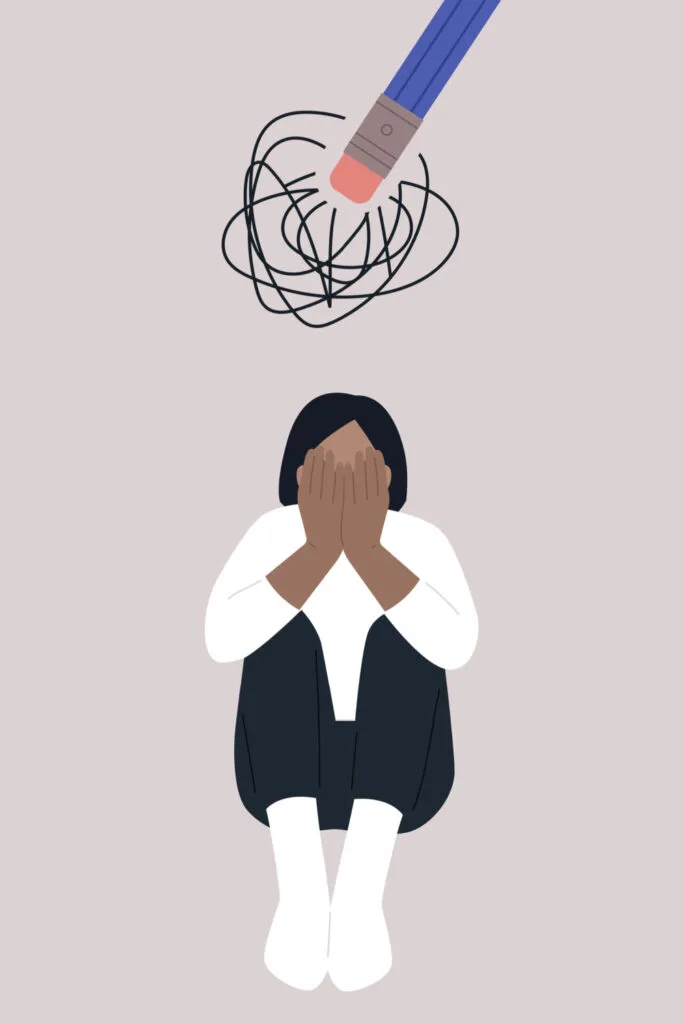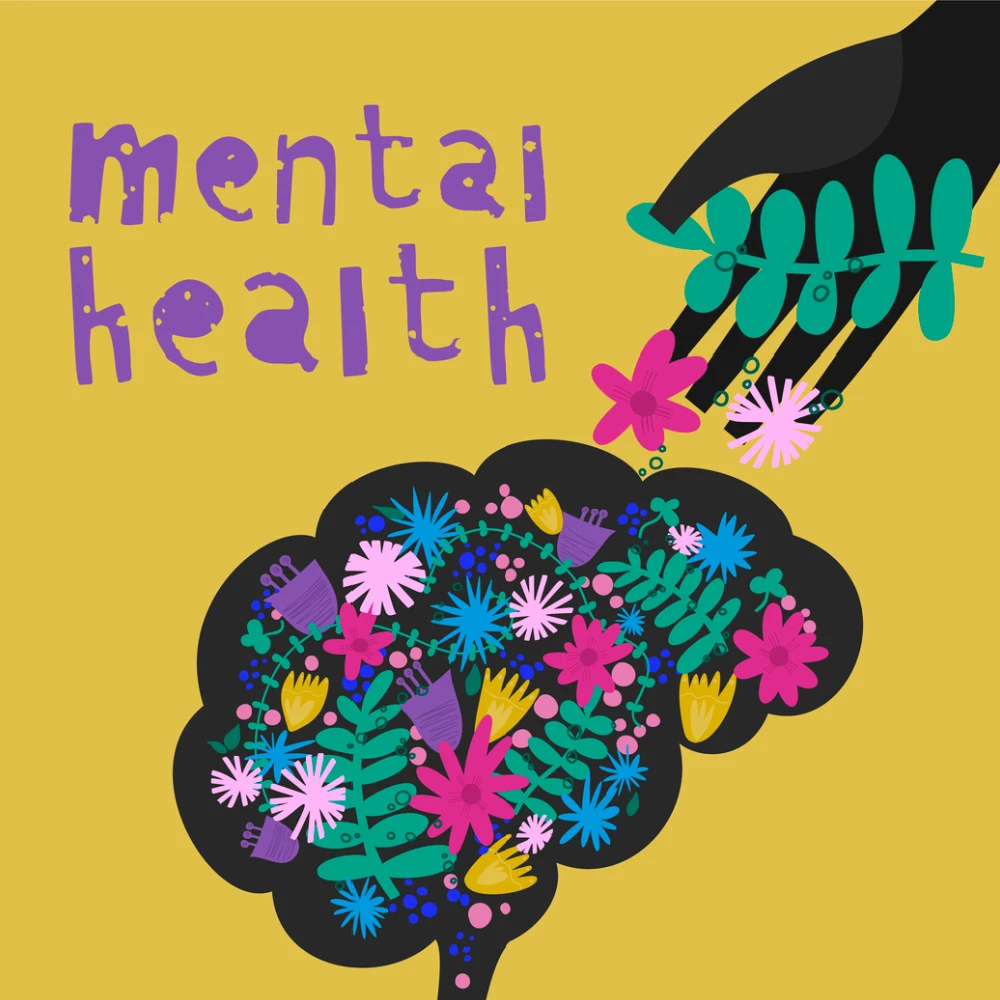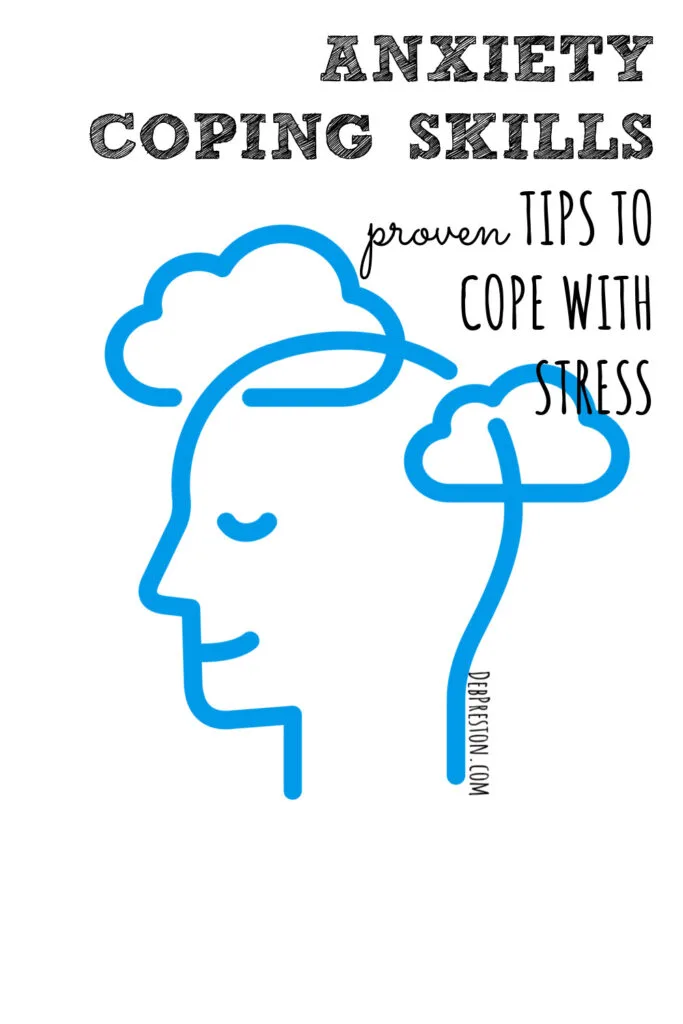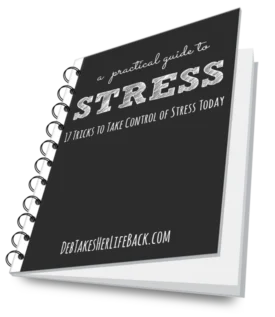Whether you’re dealing with anxiety in the moment or more long term, I think we can all agree that it’s awful. From the racing thoughts to the physical symptoms they produce, we want to end our anxiety as quickly and painlessly as possible.
While anxiety can feel overwhelming in the moment, there are actually lots of anxiety coping skills we can develop to help calm our minds and bodies and live an overall more peaceful life. And lucky for you, we’ve collected them all in one place in this post!
Understanding Anxiety
Anxiety is a normal reaction that everyone experiences at some point in their lives. It’s designed to keep you safe by preparing you to deal with challenging or dangerous situations.
Anxiety triggers can vary from person to person; some common examples include deadlines at work, social situations, or personal relationships. Your body responds to these triggers with symptoms of anxiety like an increased heart rate, a noisy and restless mind, or a sense of impending doom.
Identifying and understanding your anxiety, its symptoms, and triggers are vital first steps toward developing healthy anxiety coping skills. With the right tools and mindset, you can successfully navigate the challenges associated with excessive anxiety and improve your overall well-being.
Physical Effects of Anxiety
One of the most important steps to developing anxiety coping skills is learning to recognize the symptoms of anxiety. After all, you have to be able to recognize when anxiety is at play to know when to launch your coping skills.
Manifestations of Anxiety
When you experience anxiety, you might notice some common physical symptoms, such as sweating or trembling. Other noticeable effects may include a rapid heart rate, chest pain, shortness of breath, and even a panic attack.
It’s essential to recognize these physical manifestations and acknowledge their connection to anxiety. By doing so, you can start exploring effective ways to manage these symptoms and improve your daily life.
Anxiety and Overall Health
Dealing with anxious thoughts doesn’t only affect your emotional and mental states. It also influences your overall physical health.
Ongoing anxiety can lead to various health concerns, such as low energy or cardiovascular issues (source). These symptoms may manifest as headaches, nausea, shortness of breath, shakiness, or stomach pain when you are under stress or feeling anxious (source).
That’s why taking care of your mental wellbeing is just as important as maintaining your physical health! By developing healthy anxiety coping skills and strategies, you are taking a significant step toward enhancing your overall health and quality of life.
Coping Strategies for Anxiety
Let’s start with some in-the-moment anxiety coping skills! These are the techniques you can use to calm your body and mind when anxiety is at a high.
Relaxation Techniques
Feeling overwhelmed or anxious? Try using relaxation techniques to help reduce your anxiety.
Practicing deep breathing exercises can help you stay in control of your emotions. You may also want to explore mindfulness and meditation to help stay focused on the present and reduce negative thoughts.
Additionally, consider guided imagery techniques to help your mind visualize calming and soothing situations.
Physical Activity
Incorporating physical activity into your daily routine can significantly help manage anxiety. Engaging in regular exercise, even light activities such as yoga or a brisk walk, can release stress-reducing endorphins, increase self-confidence, and distract you from anxiety-inducing thoughts.
Remember to find an exercise that suits your interests and schedule to reap the most benefits.

Whether you’re looking for an anxiety log, trigger tracker, or worksheets to help you navigate big emotions, YouCanJournal.com’s got you covered! Their mental health journal printables offer 30 pages designed to track and guide your entire mental health journey. Snag yours here for less than $5!
Mental Coping Methods
Learning to manage and control your anxious thoughts can be a powerful tool in overcoming anxiety. You can start by identifying any irrational or negative beliefs and then practice actively challenging them.
Cognitive behavioral therapy (CBT) is an effective approach that can help you develop healthier thinking patterns. Additionally, using distraction techniques, such as focusing on a hobby or watching a movie, can temporarily help redirect your attention away from anxiety-provoking thoughts.
Social Support
Surrounding yourself with a strong social network can significantly impact how you cope with anxiety. Sharing your experiences with friends, family members, or support groups can offer you encouragement, understanding, and practical advice from those who have faced similar challenges.
If you find that your anxiety is interfering with your daily life, consider seeking professional help from a mental health professional, like a therapist or counselor.

Lifestyle Modifications
But you’re not limited to just in-the-moment anxiety coping skills! The fact is that several long term lifestyle modifications can help make you less likely to experience anxiety in the first place.
Diet and Nutrition
A well-balanced diet plays a crucial role in managing anxiety. Incorporating fruits and vegetables into your daily meals can provide essential nutrients that help in reducing stress.
It’s also important to manage your caffeine intake, as it may exacerbate anxiety symptoms. Try swapping out caffeine-heavy beverages for herbal teas or decaffeinated options to keep your anxiety in check.
Improved Sleep Patterns
Developing a consistent sleep routine can significantly impact your anxiety levels. Prioritize getting enough quality sleep by establishing a regular bedtime schedule and practicing good sleep hygiene.
Some tips for improving sleep hygiene include:
- Limiting exposure to screens before bedtime
- Creating a comfortable sleep environment
- Engaging in a relaxing pre-sleep routine, like reading or taking a warm bath
Following these practices can enhance your sleep quality, keeping you rejuvenated and better equipped to handle anxiety-inducing situations.
Stress Management
Incorporating stress management techniques into your lifestyle can also help in coping with anxiety. This can include creating a daily routine that ensures you have adequate time for work, self-care, socializing, and leisure activities.
Physical activity is another powerful tool for stress management, so try fitting exercise into your daily schedule. Find activities you enjoy, and gradually incorporate them into your routine to feel the anxiety-reducing effects.
Professional Support for Anxiety
Sometimes, you just need some extra help! I personally found that talking to a counselor not only assisted me with the issue at hand, but also helped me learn to live an overall more balanced life.
Therapy
Seeking help from a mental health professional, such as a therapist, is an effective way to cope with day-to-day anxiety as well as anxiety disorders.
Therapy can provide you with a safe space to discuss your feelings and learn valuable techniques, such as cognitive-behavioral therapy (CBT) which focuses on identifying and changing negative thought patterns and behaviors. Additionally, group therapy can offer support from peers who are experiencing similar concerns.
Medication
In some cases, your health care provider may recommend medications to help manage your anxiety. This is especially true for those wrestling with anxiety disorders.
Several types of medications, such as antidepressants, benzodiazepines, and beta-blockers, are often prescribed to treat anxiety disorders. These medications can help reduce anxiety symptoms, but they should be used under the supervision of a health care provider who understands your unique needs.
Remember, it’s essential to work closely with a mental health professional and discuss any concerns or questions about your treatment options. Thoroughly explore both therapy and medication possibilities to find the support that suits you best in your journey toward better mental health.
Drawbacks of Unhealthy Coping Mechanisms
When you face anxiety or other stress-related issues, it’s essential to handle them with healthy coping mechanisms.
Unfortunately, when you resort to unhealthy anxiety coping skills, it can worsen the situation and lead to several negative consequences. Let’s take a look at some common unhealthy coping mechanisms and their drawbacks.
Alcohol
It’s not unusual for people to turn to alcohol to temporarily numb their feelings of anxiety and panic. However, relying on alcohol to escape your problems can lead to addiction, impaired judgment, and long-term health issues, such as liver damage and increased risk of cancer.
Panic
Giving in to panic during stressful situations may seem like a natural response, but it can significantly escalate your anxiety and hinder your ability to think clearly. When you panic, your thoughts may become irrational, and your brain’s fight or flight response kicks in, making it difficult for you to cope with the situation.
Smoking
Some people use smoking as a stress-relief mechanism, believing it will help calm their nerves. Though you might feel temporary relief, smoking can lead to addiction, increased heart rate, and breathing issues, all of which exacerbate anxiety symptoms in the long run.
Recreational Drugs
Turning to recreational drugs to escape anxiety is another unhealthy coping mechanism. Not only do these substances carry the risk of addiction, but they can also hinder your ability to process emotions, leading to a worsening of anxiety and other mental health issues.
Remember, while these unhealthy coping mechanisms might provide temporary relief from anxiety, they cause more harm in the long run. It’s crucial to seek out and adopt healthier coping strategies to effectively manage your anxiety and lead a more balanced, fulfilling life.

Other Resources for Anxiety Management
As any Reading Rainbow fan knows, the more you know, the better! Thankfully, there are loads of resources out there to help you better understand and manage your anxiety.
Books
There are several helpful books available to assist you in understanding anxiety and learning effective coping strategies. Some of these books include evidence-based approaches backed by scientific research.
By reading these books, you can gain valuable insights into the causes and underlying mechanisms of anxiety. Additionally, you can learn exercises and techniques for managing your anxiety and improving your overall mental well-being.
Online Resources
Besides books, there are numerous online resources dedicated to anxiety management. Websites such as Psych Central and Positive Psychology offer a wealth of information on coping skills and strategies to help you deal with anxiety.
You can find articles, worksheets, and even interactive tools that guide you through various coping techniques. Online resources provide a convenient and accessible way to learn about anxiety management at your own pace and time.
Community Support
Don’t underestimate the importance of community support in managing your anxiety. Reach out to friends, family, and local support groups to share your experiences and gain valuable insights from others who are going through similar situations.
Many communities have dedicated organizations that offer support for individuals struggling with anxiety. These organizations often provide resources, such as informative sessions and workshops, to help you build a toolbox of coping strategies.
Engaging in community support not only connects you with people who understand your struggles but also reinforces your resolve to overcome anxiety. Remember, you are not alone in your journey, and the support you receive from those around you can make a significant difference in managing your anxiety.
Coping Skills For Kids
As you might have expected, children tend to deal with anxiety and other intense emotions differently than adults. Luckily for you, we wrote an entire article on how to develop coping skills for kids here!
The Role of Loved Ones and Society
I know, I know, I just harped on the importance of sharing your journey with others. But this topic deserves a bit more deliberation because it is just so important.
Support from Friends and Family
Having the support of your friends and family can make a huge difference when coping with anxiety.
They can offer a listening ear, provide emotional support, and even partake in relaxation activities together, such as deep breathing exercises or meditation. By spending time with you and offering reassurance, your loved ones can help alleviate your anxiety during social gatherings or other situations.
In addition to emotional support, friends and family can join you in practicing in-the-moment grounding exercises that have been proven to calm anxiety. These exercises allow you to focus on your physical environment and take your mind off anxious thoughts.
Acceptance and Awareness in Society
As you work on managing your anxiety, it’s essential to keep in mind the importance of acceptance and awareness in our society. The more people understand anxiety and its challenges, the easier it becomes for you to socialize and find support in various environments.
Promoting awareness can take many forms:
- Sharing personal experiences
- Discussing mental health in public forums
- Encouraging open conversations among friends and family
By fostering a culture of understanding, we help create a more inclusive society where individuals struggling with anxiety, like yourself, can feel more comfortable socializing and seeking help when needed.
Remember, your friends, family, and society play a crucial role in helping you cope with anxiety. Work together to build a supportive and understanding network that promotes the acceptance of anxiety and its challenges.
Anxiety in Unique Circumstances
Anxiety During a Pandemic
During a pandemic, feelings of anxiety can become more intense due to the uncertainty and fear surrounding the situation. It’s important to acknowledge your feelings and find ways to cope with the added stress.
Here are some ideas to help manage your anxiety during a pandemic:
- Stay informed, but set boundaries: It’s good to stay updated on the latest news and recommendations, but don’t overwhelm yourself with constant updates. Designate specific times during the day to check on the news and avoid information overload.
- Establish a routine: Maintain a sense of normalcy by sticking to a daily routine, including regular mealtimes, exercise, and hobbies.
- Stay connected: Make an effort to keep in touch with friends and family through phone calls, video chats, and messages. Social connections can provide comfort and emotional support.
Dealing with Social Anxiety
Social anxiety can make it challenging to navigate daily life and relationships. Here are some strategies to help you cope:
- Practice deep breathing: If you find yourself feeling anxious in social situations, try taking slow, deep breaths to calm your nerves and regulate your emotions.
- Challenge negative thoughts: Take note of any negative thoughts that arise during social interactions, and try to reframe them in a more positive light.
- Expose yourself to social situations gradually: Don’t avoid social situations entirely. Instead, slowly expose yourself to them, starting with smaller, more familiar settings before gradually moving on to more challenging environments.
By implementing these coping strategies, you can work towards managing your anxiety in these unique circumstances, allowing you to live a healthier and more fulfilling life.

And there you have it…from in-the-moment coping strategies to lifestyle modifications, these anxiety coping skills are sure to help you more effectively respond to and manage your anxiety. My friend…you’ve got this!
Frequently Asked Questions
How can I manage anxiety without medication?
You can manage anxiety without medication by adopting various relaxation and mindfulness techniques. For example, practice deep breathing exercises, progressive muscle relaxation, and meditation regularly.
Maintaining a healthy lifestyle, including regular exercise, a balanced diet, and adequate sleep, can also help reduce anxiety. Additionally, consider seeking support from friends, family, or a mental health professional to help manage your anxiety.
What techniques are effective in handling anxiety?
There are several effective techniques to handle anxiety. These include cognitive behavioral therapy (CBT), exposure therapy, mindfulness-based stress reduction (MBSR), and dialectical behavior therapy (DBT).
These therapies can help you develop coping skills to reduce anxiety symptoms and improve your overall mental well-being. You can also try relaxation techniques like deep breathing, progressive muscle relaxation, and guided imagery to help manage anxiety.
What are some useful worksheets for anxiety coping skills?
You can find various worksheets and resources online to help you practice anxiety coping skills. Some of these include the Coping Skills: Anxiety worksheet from Therapist Aid and the anxiety coping skills worksheets from Positive Psychology.
These worksheets provide guidance on how to perform specific exercises and techniques to manage your anxiety.
How can I overcome social anxiety?
To overcome social anxiety, start by gradually exposing yourself to social situations that cause you discomfort. This exposure may involve attending social events, joining clubs or organizations, or practicing conversations with friends or family members.
Learning and practicing relaxation techniques like deep breathing can help you feel calmer in social situations. You may also benefit from joining a support group for people with social anxiety or seeking professional therapy, such as cognitive-behavioral therapy, to help you develop coping strategies.
What is the 3-3-3 rule for managing anxiety?
The 3-3-3 rule is a grounding technique used to manage anxiety and panic attacks.
When you feel anxious, try to identify three things you can see, three things you can hear, and three parts of your body you can feel, such as your hands on a surface or your feet on the ground. This technique helps you focus on your surroundings and bring your mind back into the present moment, reducing your anxiety.
Can you suggest some activities to cope with my anxiety?
Yes, here are some activities that may help you cope with anxiety:
- Engage in regular physical activity like walking, jogging, or practicing yoga.
- Try mindfulness meditation to help you become more aware of your thoughts and feelings.
- Express your emotions through creative outlets like writing, drawing, or painting.
- Connect with supportive friends, family members, or support groups to share your feelings and experiences.
- Practice good sleep hygiene by maintaining a regular sleep schedule, creating a relaxing bedtime routine, and ensuring your sleep environment is comfortable.
- Dedicate time to enjoyable hobbies or interests to provide a distraction from your anxiety.

P.S. Could you use a little more help in managing day-to-day stressors? Download A Practical Guide to Stress | 17 Tricks to Take Control of Stress Today to help you develop a game-changing stress management plan. It’s free! Get yours HERE.
Disclosure: While all opinions are our own, we are a participant in the Amazon Services LLC Associates Program and other affiliate advertising programs, designed to provide a means for us to earn fees by linking to Amazon.com and affiliated sites, at no additional cost to you.



